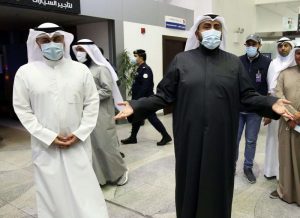When China sneezes, the world takes to its sick bed
Regional tourism may suffer the debilitating effects of Covid-19, which can be passed through the air.

Kuwaiti health minister Sheikh Basel al-Sabah (R) speaks to the press at Sheikh Saad Airport in Kuwait City, on February 22. (AFP)
The MENA region’s first confirmed coronavirus deaths — two Iranians in the holy city of Qom — are reminders of a two-pronged reality: the world is increasingly linked and it has a growing reliance on China.
In the 19th century, Metternich, the veteran Austrian diplomat, declared that “when France sneezes, Europe catches a cold.” The phrase was adapted in the 20th century to the new hegemon, the United States. In the 21st century, it is when China sneezes — from coronavirus or anything else — that the whole world takes to its sick bed.
China’s importance to the world economy is difficult to overstate. It is the second-largest economy, an engine of global economic growth, imports the most crude oil and is the biggest buyer of intermediate goods used in the manufacture of everything from hair dryers to automobiles. It has become the hub for producing and exporting finished goods and components all over the world.
Chinese travellers accounted for about 20% of total spending on tourism in 2018, the World Tourism Organisation said. One in every 16 visitors to the United Arab Emirates is from China. Dubai received almost 1 million Chinese travellers last year when it pushed its “China ready” strategy, complete with city-wide Chinese New Year celebrations, Mandarin-language restaurant menus, Mandarin-speaking airport staff and collaboration with Chinese mobile payment giants Alipay and WeChat.
Unsurprisingly, then, the coronavirus outbreak is sickening prospects for disparate sectors in the region. This, despite that two coronaviruses — they are a family of virus — proved to be much more severe. Middle East Respiratory Syndrome (MERS) and severe acute respiratory syndrome (SARS) killed more than 1,500 people between them since 2002. The death rate of the China coronavirus, officially called Covid-19, is about 2% but MERS was 30% and SARS 10%.
Even so, the world has moved on a great deal from SARS, the last time a coronavirus spread from China. In the past 17 years, China has become much more closely linked to the rest of the world economy. Accordingly, there is the huge issue of oil prices.
After a volatile 2019, the growth in global oil demand was expected to fall by at least one-quarter this year. Bjornar Tonhaugen of Rystad Energy, the Norwegian research and business intelligence company, said “the economic shut-down in China will cause the largest negative oil demand shock since 2008.”
Tonhaugen added that the demand gap exacerbated by the coronavirus would not be offset by output cuts agreed by OPEC and the drop in Libya’s oil production.
Economic analysts predicted that weaker demand will be a particular worry for Oman, which sends about 45% of its exports, mostly oil, to China. The regional picture is a worrying one of higher forecast fiscal deficits because of lower oil prices, more spending and weak growth. S&P Global, the New York market intelligence firm, said Saudi Arabia’s fiscal deficit could hit 7.4% of GDP this year.
Regional tourism may also suffer the debilitating effects of Covid-19, which can be passed through the air, has spread further in nearly three months than SARS in 2003 and has infected tens of thousands.
There is some suggestion that travel restrictions triggered by the outbreak may affect attendance at Expo 2020, to which Dubai had hoped to attract 11 million foreign visitors. However, the 6-month-long event doesn’t kick off until October and the UAE capital must hope this particular coronavirus will by then be a long-forgotten contagion.
In health terms, the MENA region has been relatively unaffected by the virus. One positive test result was confirmed in Egypt — the only case in Africa — but the World Health Organisation said on February 19 that the person was “no longer carrying the virus.” Nine people tested positive in the United Arab Emirates, seven of them Chinese, the others an Indian and a Filipino.
However, the deaths in Qom and reports that 25 people were quarantined in the city bring the risk posed by Covid-19 much closer. The region’s health systems are already overburdened. It is also beset by conflicts that remain stubbornly resistant to resolution, allowing for little bandwidth to deal with the outbreak of a fast-spreading disease.
Add to that the anxiety provoked by the Iranian authorities’ first terse comments on the Qom deaths. By failing to specify the circumstances in which the deceased were infected, the Iranians added a worrying element of mystery to the shock of the region’s first Covid-19 deaths.
Muslims in China are almost all Sunni and would be unlikely to visit Qom, which is known for its Shia seminaries. This raises questions about how the individuals in Qom contracted the disease and whether it points to a broader regional vulnerability.
Originally published in The Arab Weekly

